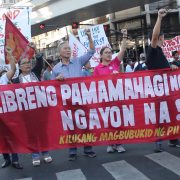Red-tagging threatens a person’s right to life, SC declares
Red-tagging, vilification, labeling, and guilt by association threaten a person’s right to life, liberty, or security, which may justify the issuance of a writ of amparo, the Supreme Court (SC) ruled.
In a decision released today, the SC ruled in favor of veteran activist and former Bayan Muna Representative Siegfred Deduro who petitioned for relief against red-tagging activities him by the Armed Forces of the Philippines.
Deduro claimed that on June 19, 2020, in a Iloilo Provincial Peace and Order Council meeting, military officers “explicitly identified (him) as part of the Communist Party of the Philippines-New People’s Army (CPP-NPA) hierarchy.”
The military officers were then under the command of a Maj. Gen. Eric C. Vinoya of the Philippine Army’s 3rd Infantry Division based in Panay Island, Deduro’s complaint stated.
The military’s accusations against the veteran activist were later reported by Bombo Radyo Iloilo and the Philippine News Agency.
In his petition for a writ of amparo, Deduro said he was further accused of associating with underground revolutionary groups through posters scattered throughout Iloilo City.
He said he was also tailed by unidentified men who were presumed to be government security personnel.
Deduro earlier filed a similar petition with a lower court but was denied.
The SC in an en banc decision however found prima facie evidence in Deduro’s petion and granted the former legislator’s request for a writ of amparo.
The High Court defined the writ as “a remedy available to any person whose right to life, liberty, or security is violated or threatened by an unlawful act or omission of a public official or employee, or of a private individual or entity.”
Deduro has yet to respond to Kodao’s request for a statement on his victory.

National Union of Peoples’ Lawyers official Ephraim Cortez said SC’s ruling on the petition and remarks against red-tagging do not make it a criminal offense however.
“Only congress can define and penalize it as a crime. But since it is now interpreted as a threat to life, liberty or security, red tagging may be used as a basis to file a criminal complaint for grave threat defined and penalized under the Revised Penal Code,” Cortez told Kodao.
The Kilusang Magbubukid ng Pilipinas (KMP) meanwhile hailed the SC’s definition of red-tagging as a threat is “on point.”
“We are in unity with the Supreme Court’s view and opinion that red-tagging threatens the right to life, liberty, and security. Our leaders, members, and affiliates are actual victims of red-tagging and even terror tagging and they experienced first-hand the dangers that come with this rights violation often perpetrated by the NTF-ELCAC and their cohorts,” KMP chairperson and red-tagging victim Danilo Ramos said.
The group said the practice often leads to the killing of farmers and peasant leaders and the illegal arrest and detention of activists and civilians who are exercising their freedom of expression, freedom of assembly, and right to self-organization.
KMP pointed a finger at the National Task Force to End Local Communist Armed Conflict (NTF-ELCAC), created by former President Rodrigo duterte’s Executive Order (EO) 70, as the main perpetrator of red-tagging.
“This latest SC ruling is an added justification for the dismantling of NTF-ELCAC and EO 70’s junking,” KMP said. # (Raymund B. Villanueva)







